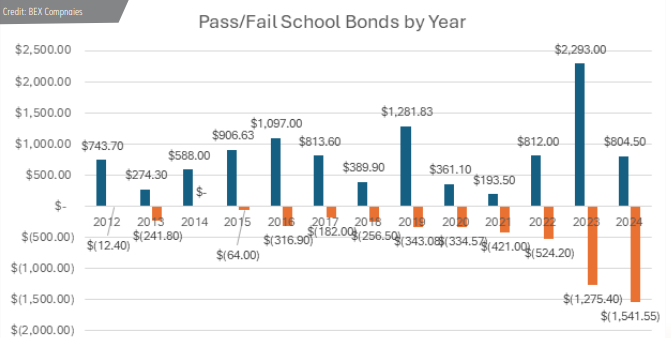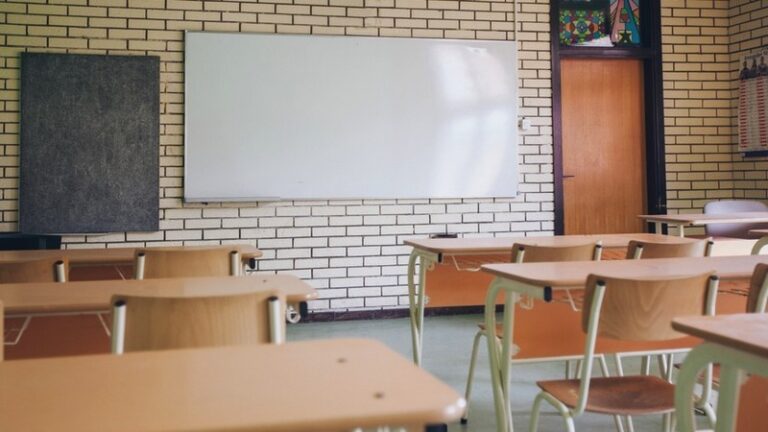By Rebekah Morris for AZBEX
Funding for public construction was something of a mixed bag at the Nov. 5 ballot across the state. General Obligation bonds for the cities of Buckeye, Mesa and Tempe passed, as did Prop 479 in Maricopa County and Prop 486 in Pinal County. Bonds for K-12 districts, on the other hand, saw nearly 2/3 by dollar volume lacking sufficient support and headed toward defeat.
Municipal Bonds All Passed by Voters
The City of Tempe had the largest bond on the ballot in Arizona at $500M. The bond was spread across three questions:
- $301M for Public Safety & Roadway Improvements—these funds will be used to improve infrastructure and roadways, repair and renovate police and fire stations, improve traffic control systems and improve sewer and flood control.
- $248.5M for Quality of Life—these funds will be directed toward parks and playground improvements, municipal infrastructure and facilities and to acquire and preserve historic properties.
- $32M to Increase Supply of Affordable Housing—these funds will be used to redevelop City-owned housing, repurpose existing buildings into rental properties and acquire land for development of affordable housing.
The City of Buckeye had two bond questions on the ballot totaling $282M.
- Prop 494 would allocate $137M for public safety projects including: Public Safety Headquarters, training facilities, Westpark Fire Station and Victory Fire Station.
- Prop 495 provides $145M for Streets & Transportation projects including: Widening Indian School Road from Jackrabbit to Perryville and installing lighting along parts of Sun Valley Parkway.
The City of Mesa had two bond questions on the ballot totaling $260M.
- $90M for Public Safety capital projects, which would include a new emergency 911 communications center and new fire engines.
- $170M to expand Parks, Recreational Facilities and Cultural Experiences, which will fund a variety of park projects, a new recreational facility and aquatic center and renovate the i.d.e.a. Museum.
Transportation & Transit Measures Pass with Wide Support
Both Maricopa and Pinal counties had tax measures presented to voters that would help fund long-range transportation and transit projects.
In Maricopa County, Prop 479 will continue the existing half-cent sales tax that was first approved by voters in 1985. The funding from this sales tax invests in major transportation and transit projects, such as the light rail and Tempe Streetcar. The 20-year continuation of the tax is expected to generate $14.9B.
Similarly, Pinal County had Prop 486 on the ballot, which would continue an existing half-cent sales tax that was originally approved by voters in 1986. The funds will be used for roadway maintenance and improvements.
$804.5M in K-12 Bonds Pass

The slightly more than $800M of total K-12 bonds that were approved by voters is right in line with the volume approved on average in the 12 years since BEX has been tracking bond passage rates. However, the $1.5B in failed measures far exceeds any year on record.
Glendale Union High School District was successful at passing its $195M bond. The bond proceeds will fund a variety of projects and district needs such as mechanical, electrical and plumbing repairs and upgrades, school safety and security, school building replacement, parking lot resurfacing, and performing arts facilities upgrades.
Roosevelt Elementary succeeded in passing its $150M bond question. The bulk of the bond funds ($110M) is planned for construction and/or replacing school buildings and student facilities. Another $33M is planned for upgrading safety and security systems, modernizing labs and classrooms, and renovating school grounds like athletic fields and playgrounds.
Tolleson Elementary School District #2 passed a $125M bond. The bond monies will be used for construction of additional school buildings, technology, preventative maintenance, improvement of school grounds and new capital assets, such as buses.
Creighton Elementary School District was able to secure $85M in bond authority. The funds will be used for a variety of construction projects and facilities maintenance and upgrades, safety and security upgrades, energy efficiency projects and new capital assets, such as buses.
Amphitheater Unified School District outside of Tucson was successful at passing its $84M bond question. The bond funds will be used for safety upgrades, roofing and HVAC upgrades and replacements, upgrading of fire alarms and finishes, as well as improving school grounds, such as playgrounds and athletic fields.
Maricopa Unified School District appeared to squeak by victoriously with its $70M bond question. As of Nov. 6, the question was approved by a razor thin margin of 132 votes.
Laveen Elementary School District #59 passed its $50M bond question. The proceeds from the bond sales will fund construction of new facilities, safety and security upgrades, and transportation assets.
Balsz successfully passed its $35M bond question.
Wilson Elementary School District was able to secure approval from voters for a $10.5M bond question. The bond monies will be spent on security upgrades at facilities, ongoing structural repairs, building maintenance and energy efficiency projects.
Voters Declined to Support Schools in Big Numbers
The $1.5B in failed bond measures at the bond was both staggering and record-setting. Historically, voters have approved 65%-70% on average over the last 12 years. Statewide K-12 bond measures averaged $900M/year until 2023, when an enormous $3.568B worth of bond questions were on the ballot. Just shy of 65% of those bond dollars passed voters.
In 2024, a second year of massive bond questions were presented to voters totaling $2.346B. Adding in these last two years, the average ask of voters is now $1.2B annually.
Ten of the 19 K-12 bond measures failed this year, or $1.5B worth of financing capacity that districts rely on to build new facilities. Traditionally, the State has not funded new school construction, and the responsibility for financing education spaces falls to the local voters via bond authorization.
The list of districts whose bond questions failed at the ballot are:
- Agua Fria HS District: $138M (failing by 132 votes as of 11/6/24)
- Apache Junction USD: $20M
- Buckeye Union: $155M
- Chandler Unified School District #80: $487.5M
- Deer Valley Unified School District: $325M
- Dysart Unified: $127M
- Higley Unified School District: $83.1M
- Peoria Unified School District: $120M
- Toltec Elementary School District #2: $9M
- Yuma Elementary School District #1: $77M
Some Districts have Struggled to Pass Bonds for Years
This is the fourth time Peoria voters have declined to support a bond to build new facilities in areas of high population growth since 2016. The district is in desperate need of additional space to ease overcrowding in schools.
In a similar high-growth area on the opposite side of the Valley, Queen Creek voters have declined to support three consecutive years of bond questions on the ballot in 2021, 2022 and 2023. Shortly after the most recent bond vote failed, the state stepped in to fund the critically needed school construction.
This is the second year in a row that voters in the Deer Valley Unified School District have declined to support a $325M bond. It also marks the third time in six years that voters in the Buckeye Union school district have failed bond questions.
Lawsuit Pending for School Facilities Funding
In 2017, several school districts joined forces and sued the State over funding for K-12 facilities. After years of delays, the lawsuit went to trial in June of 2024. As of October, the closing statements have been filed, but no judgment or settlement information is available.

